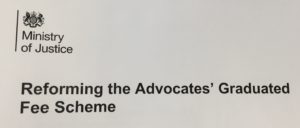Reforming the AGFS – A Consultation
A consultation into the Advocates’ Graduated Fee Scheme – AGFS – began on 5 January 2017 that runs until 2 March 2017. The intention is that Crown Court advocates’ fees be restructured to ‘ensure fair payment for work done’ and ‘more certainty for all advocates, in particular junior advocates’.
 While there might be other arguments to be had about which kind of advocate should receive the larger fees, or whether the fees should be directed towards a certain kind of case, perhaps the immediate concern for all who earn the fees will be whether, across a range of offence that any given advocate can expect to do, the new fees represent a fee cut.
While there might be other arguments to be had about which kind of advocate should receive the larger fees, or whether the fees should be directed towards a certain kind of case, perhaps the immediate concern for all who earn the fees will be whether, across a range of offence that any given advocate can expect to do, the new fees represent a fee cut.
Increased Sustainability?
This will allow discussion as to whether the proposed fees improve (or not) the financial viability of criminal legal aid work and therefore the sustainability of the profession, whether as a barrister at the independent bar or an employed solicitor advocate.
The work that we did was on advocacy fees billed in January 2017 from our Nottingham office, and included calculations for cases dealt with both in-house and by external counsel.
The figures produced were hardly surprising. In cases that we dealt with in-house the comparison showed that there would be a fee reduction of 16% across the sample of cases. In relation to those cases briefed to external counsel, although the overall gain was 21%, this was almost entirely accounted for by a single trial for a terrorism offence where the percentage uplift was an incredible 297%. Without that case, there would have been a modest fee increase of 2%.
Reduction in AGFS fees across the board
Across the entire month of January, removing the terrorism case, if the proposals are brought in unchanged then we can expect them to be reflected in a reduction in fees of 7%. Assuming that the work we undertake is a broad range of case types and comparable to other firms or advocates, it seems likely that an overwhelming number of those undertaking this type of work will receive a similar fee cut.
The AGFS consultation paper requests an answer to twenty-five questions. Only one of them asks ‘Do you agree with the individual fees proposed?’ If the work that we have done is representative then none of the modelling put forward in the consultation document would seem correct.
Incorrect MoJ Analysis?
For example, an analysis of sexual offence cases billed in January shows a much more modest increase of 4% rather than the 32% predicted in this table. Further, half of our calculations for sex cases resulted in a fee reduction rather than even a modest increase.
Our work over a single month has demonstrated that the effect on employed junior advocates alone is not cost neutral, and it appears hard to see how the modelling could have reached that conclusion.
Our analysis of burglary/robbery bills suggest that they remain cost neutral rather than result in a 4% fee uplift. An admittedly small sample of drugs offences resulted in a 33% reduction in fees that will be able to be claimed.
Need for an Increase not a Re-shuffle
To return to the aims of the reform, it seems that the only certainty for the junior bar with a caseload comparable to the workload the we undertake is that they will be paid less across the piece. As a result, it appears difficult to see how this can result in ‘fair payment for work done’.
Hopefully others will be reflecting upon similar figures under the new AGFS, and arguing that the only answer to sustainable provision of legally aided representation before the Crown Court is an increase in fees across the board, rather than a restructuring that amounts to the cliched rearranging of deckchairs on the Titanic.




